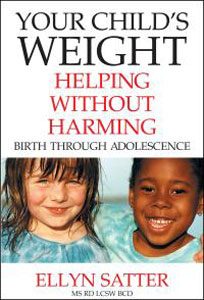

Family Meals Focus
The Ellyn Satter Institute Newsletter
A preschooler who gained too much weight
by Ellyn Satter, Nutritionist and Family Therapist
Click here for a PDF of this newsletter
A year previously, 4½ year old Christopher’s weight suddenly catapulted upward, accelerating from his current 75th percentile curve to way off the growth chart. Christopher’s parents said he was voracious. He hounded them constantly for between-meal food handouts, had tantrums unless he was supplied with a tippy-cup of juice at all times, and insisted on getting exactly what he wanted at mealtime.
In short, Christopher was a small tyrant who was running the show with eating. But that was nothing new, he had been doing that since he was a toddler. Therein lay one of the keys that unlocked the puzzle. When he was a year old, rather than teaching him to eat meals with the rest of the family, Christopher’s parents continued to feed him on demand. As with other toddlers, that lack of structure and limits frightened Christopher, and he pushed his parents to provide those by behaving badly. He became a nuisance with his eating. He pestered his parents for food handouts. He constantly ate on the run. He made a mess. Christopher’s mother understood why he was behaving so badly, but she just couldn’t bring herself to provide the limits that Christopher needed. As she put it, “I know it wasn’t right to feed him that way, but I didn’t like to tell him no for fear he won’t love me.”
That bit of developmental information prompted me to take a closer look at Christopher’s earlier growth chart. Those toddler errors in feeding appeared to be reflected in his weight. Between 15 and 36 months, Christopher’s weight accelerated from the 50th to the 75th percentile. It remained consistent for the next year and a half, when his weight showed the abrupt and extreme increase that brought his parents into my office.
It appeared that poor toddler feeding had disrupted Christopher’s growth, but only modestly. He adapted to this new version of demand feeding, and his weight leveled off. However, those poor feeding practices were sitting there like a little ticking time bomb, waiting to go off. It was a family crisis that lighted the fuse. Christopher’s anxiety went way up, his grazing and food demands became greatly exaggerated, and Christopher gained weight rapidly.
Grazing is the culprit
Christopher’s parents illustrated a currently prevailing poor feeding practice. Many parents allow their toddlers (or older children) to graze for food rather than teaching them to participate in the meals-plus-snacks routine of the family meals. Like Christopher, children who graze often have trouble eating the amount of food they need. Some overeat, and their weight accelerates. Some undereat, and their weight falters. Grazing is the real culprit behind the observation that “children get too fat because they eat potato chips and candy or drink soda all the time.” In my clinical experience, it isn’t the food but the lack of structure and support with feeding that causes the problem.
While many poor feeding practices contribute to excessive child weight gain, toddler grazing has a particularly nefarious impact. Children of all ages must get their emotional needs met in order to do a good job with eating–to eat the amount they need to grow well and to learn to like the foods their parents eat. Toddlers who aren’t taught to join in with the rest of the family at mealtimes don’t get their emotional needs met, and they don’t eat well.
While many poor feeding practices contribute to excessive child weight gain, toddler grazing has a particularly nefarious impact.
Grazing teaches eating for emotional reasons
Moreover, allowing children to graze increases the likelihood that they will learn to use food for emotional reasons. To learn to tolerate and express their anger, sadness, boredom and other negative feelings, toddlers depend on parents to accept those feelings and apply the appropriate solution. The parent tolerates the child’s anger, accepts his sadness, redirects his boredom. A lack of structure with feeding offers food as an all-too-available solution for toddler upset. Giving food handouts to diffuse, soothe, or entertain teaches children to use food for emotional reasons.
Stress builds on feeding errors
Which brings us to stress, the other key in explaining Christopher’s extreme weight gain. In the year that his weight had been accelerating, Christopher had been under way too much stress. He had a new baby sister. Everybody has stress, even young children. Unless there are extenuating circumstances, a child can cope with the stress of having a new sibling. Christopher could learn to manage.
The stress that Christopher couldn’t manage, however, was the conflict between his parents. For the last year, Christopher’s parents had been at loggerheads about whether this father would relocate the family to a new job and a new city. For Christopher’s father, the move was a foregone conclusion. He would have more opportunities and earn more money. For his mother, the move was a trauma she was desperate to avoid. She was a shy person who had only with great difficulty gotten acquainted in her current neighborhood. It overwhelmed her to consider starting all over again in a new place.
Imagine Christopher’s stress, had his parents tried to impose food restriction on top on everything else! Instead, Christopher’s parents worked hard to establish a division of responsibility in feeding. They became conscientious about having regular and reliable meals and snacks and learned to be considerate without catering with planning family menus. At regular eating times, Christopher ate what and as much as he wanted and ignored the rest. At first, Christopher’s mom needed support to refuse his endless demands for food, but she reassured both him and herself that a meal or snack was coming soon. Christopher’s food-begging—and anxiety—went way down, and Christopher became a happy and relaxed boy who enjoyed meals with his family and behaved nicely there. It was Christopher’s mom who came up with the solution to the kids-at- potlucks-lining-up-for-the-sweets dilemma. “What would I do if I weren’t worried about his weight?” she wondered. “So, I just told those kids to lay off the brownies because I wanted some for myself!” Christopher’s weight stabilized, and had we been able to follow him for a few years, we may have seen it gradually go down. But maybe not. After all, was that really the point?
The moral of the story? With children and excess weight gain, it is way more than “calories in, calories out.” Children don’t just gain weight for no reason. There is a cause, and the health professional who plays detective by taking a holistic approach to assessment and intervention helps parents find and address that cause.
Explore
Understand and Apply ecSatter
For help with raising your big child or your small child to feel good about himself and have the body that is right for him, read Ellyn Satter's Your Child’s Weight: Helping Without Harming
Address child weight wisely and well
- Avoid restriction
- Children know how much they need to eat
- Follow the Satter Division of Responsibility in Feeding (sDOR)
- Raise a healthy child who is a joy to feed
- The “overweight” child
- Handout: Your Child's Weight
Related issues of Family Meals Focus
- Child overweight: are current guidelines helpful? do they do harm?
- Children who are obsessed with food
- Court-ordered placement for child obesity: what can you do to help?
- Dieting and mental health
- Do children lose the ability to self-regulate?
- Food restriction in disguise
- Helping without harming with child overweight
- Managing “junk” food AKA sweet, chips, sodas
- Moves and counter-moves with feeding your child
- School nutrition horror stories
- Schools are not weight-loss camps
- Should you control portion sizes?
- Sticky topic of Halloween candy
- Vegetable agenda: Getting children to eat “nutritious” food

